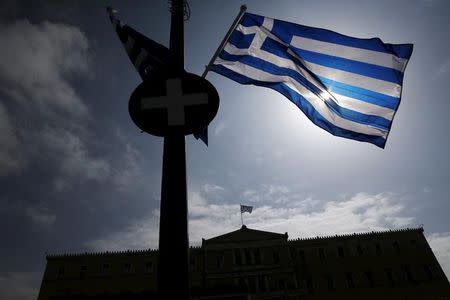Neither Grexit, nor Grexident. Euro and 'drachma' in parallel?

By Jan Strupczewski
BRUSSELS (Reuters) - Greece is unlikely to exit the euro, either intentionally or accidentally. But it might be forced to introduce an alternative means of payment, in parallel to the euro, to pay some domestic bills if a reform-for-cash deal with its creditors is not secured soon, several euro zone officials said.
Athens has lost access to bond markets and international creditors are not willing to lend it more money until it starts implementing reforms. An official familiar with the matter told Reuters this week that without fresh funds, the government will run out of money by April 20.
"At some point, when the government has no more euros to pay salaries or bills, it might start issuing IOUs -- a paper saying that its holder would receive an x number of euros at a point in time in the future," one senior euro zone official said.
"Such IOUs would then quickly start trading in secondary circulation at a deep discount to the real euros and they would become a 'currency', whatever its name would be, that would exist in parallel to the euro," the official said.
If the government ran out of euros to pay wages, pensions and suppliers, it would have to introduce capital controls to prevent a mass outflow of euros from the country. That might limit the amount Greeks can withdraw from cash machines or send abroad, as happened in Cyprus in 2013.
The IOUs might not be widely accepted in shops and could be used as a way to settle only some government-related payments such as energy bills, at least initially.
At the same time the government would keep euros from tax revenues to cover debt repayments to avoid default.
"The arrangement could be temporary to keep the government going as it hopes to negotiate a deal with creditors that would unlock more euros in loans," a second euro zone official said.
The officials said Greece has already shown in the past that it was willing to delay payments on its domestic obligations to save euros needed for debt redemptions.
Athens has lately relied on repo transactions - where it borrows money from state entities - to cover its cash crunch, but can continue for only a few more weeks, the source told Reuters earlier this week.
The Greek government declined to address questions about a possible parallel currency, saying it expects an agreement with creditors soon along lines discussed by Prime Minister Alexis Tsipras in talks on the sidelines of an EU summit last week.
"The Greek government believes that there will be a deal at the Eurogroup and funding will be released after that, as agreed at the seven-party meeting," a Greek government official said.
DEFAULT INSIDE EURO?
Greek officials, including Finance Minister Yanis Varoufakis, have dismissed the idea of Greece quitting the euro on its own and there is no legal way, nor political will among the other 18 countries sharing the currency to kick Greece out.
"There is no means of forcing a country out of the euro zone or out of the European Union and Greece has no intention of leaving on its own," the second euro zone official said.
Some economists argue that Greece could have an incentive to return to the drachma because then it could sharply devalue its new currency to make exports more competitive and attract a big increase in tourism.
But that would also make Greece's huge public debt in euros impossible to repay, forcing it to default.
"If they were to default, it is better to do that inside the euro zone rather than outside, because then it would become a problem of all the countries sharing the euro, rather than just Greece," a third official said.
In a video from 2013 when he was still an academic, Varoufakis made exactly that point.
"My proposal was that Greece should simply announce that it is defaulting within the euro in January 2010 and stick the finger to Germany and say: well, now you can solve this problem by yourself," the future minister was filmed as saying.
The big question then would be if the European Central Bank would then continue to keep the Greek banking sector liquid through its Emergency Liquidity Assistance (ELA) that is designed only for viable banks that have liquidity problems.
If the ECB pulled the plug, the Greek banking sector would most likely collapse, forcing a recapitalization in the new "currency" or, if the consequences of such a collapse were to dire to contemplate, the euro could agree to again recapitalize the banks, possibly even through its bailout fund ESM.
But officials said such options were so many "ifs" away that they were not even informally discussed.
(Additional reporting by Renee Maltezou; Editing by Paul Taylor)

